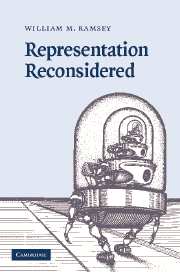Book contents
- Frontmatter
- Contents
- List of figures
- Preface
- 1 Demands on a representational theory
- 2 Representation in classical computational theories: the Standard Interpretation and its problems
- 3 Two notions of representation in the classical computational framework
- 4 The receptor notion and its problems
- 5 Tacit representation and its problems
- 6 Where is the representational paradigm headed?
- References
- Index
1 - Demands on a representational theory
Published online by Cambridge University Press: 12 November 2009
- Frontmatter
- Contents
- List of figures
- Preface
- 1 Demands on a representational theory
- 2 Representation in classical computational theories: the Standard Interpretation and its problems
- 3 Two notions of representation in the classical computational framework
- 4 The receptor notion and its problems
- 5 Tacit representation and its problems
- 6 Where is the representational paradigm headed?
- References
- Index
Summary
A common feature of scientific revolutions is the discarding of the theoretical posits of the older theory in favor of the posits invoked by the new theory. The abrupt shift in the theoretical ontology is, of course, one of the things that can make a scientific upheaval so dramatic. Sometimes, however, it happens that the displaced posits hang around for a considerable stretch of time. Despite losing their explanatory value, they nevertheless retain their stature and prominence as even revolutionary thinkers resist abandoning something central to their basic understanding of the subject. The posit is perhaps transformed and re-worked as theorists contrive to fit it into a new explanatory framework for which it is ill-suited. Yet its appearance in the new theory is motivated not by any sort of explanatory necessity, but by a reluctance to reject familiar ontological commitments. When this happens, there can be a number of undesirable consequences. One is a failure to appreciate just how radical the new theoretical framework is; another is a confused understanding of the explanatory framework of the new theory, due to an extended attempt to incorporate theoretical posits that don't belong.
The status of celestial spheres shortly after the Copernican revolution helps illustrate this point. In Ptolemy's system, the spheres did real explanatory work; for instance, they helped explain what kept the massive array of stars in place as they orbited around the Earth.
Information
- Type
- Chapter
- Information
- Representation Reconsidered , pp. 1 - 37Publisher: Cambridge University PressPrint publication year: 2007
